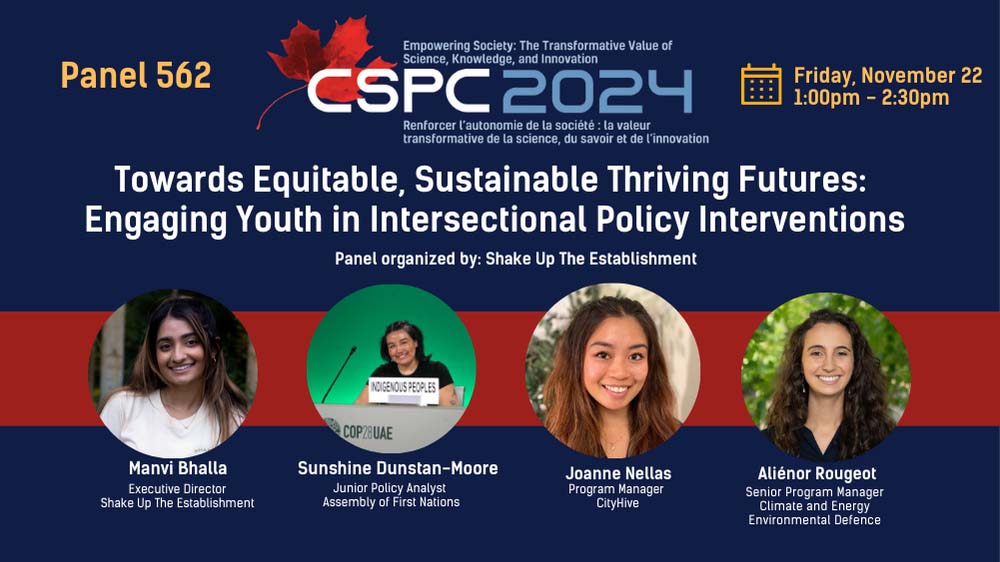Abstract:
According to a 2023 study by Galway & Field, 65% of young Canadians feel the government is not doing enough to address the climate crisis. This illuminates a critical need to improve the ways in which youth engage and view policy work. This expert panel hosted by Shake Up The Establishment features young leaders from CityHive, Sacred Earth Solar, SevenGen Energy, and David Suzuki Foundation. Panelists will showcase their policy advocacy experience and discuss issues such as youth engagement in policy, addressing barriers towards political engagement, an intersectional environmental justice lens in policy feedback, and designing climate justice policy interventions.
Summary of Conversations
The panel explored youth engagement in policy and government, particularly concerning climate justice. Discussions highlighted barriers such as a lack of civic literacy, underrepresentation, and distrust in institutions. Personal stories emphasized the emotional toll on young activists, particularly in communities facing climate disasters. The panel also addressed how to make public consultations more inclusive, stressing the importance of representation, cultural understanding, and creating safe, comfortable spaces. The conversation extended to addressing the rise of right-wing influence among young men, emphasizing the need for bridge-building and challenging traditional notions of anger and emotion. Overall, the panel advocated for centring marginalized voices and reshaping policy-making to be more equitable and effective.
Take Away Messages/ Current Status of Challenges
- Lack of Civic Literacy: Many young people lack basic knowledge of how local governments operate and how to effectively engage in civic processes.
- Underrepresentation and Distrust: Youth, especially those from marginalized communities, often don’t see themselves reflected in policy-making spaces, leading to distrust and disengagement.
- Emotional Burden: Young activists face significant emotional distress due to the climate crisis and other societal challenges, impacting their well-being and long-term engagement.
- Scarcity Mindset: The idea that greater equity for some groups means less for others, creating resistance to inclusive policies.
- Colonial Structures: Traditional consultation methods often perpetuate colonial power dynamics, failing to address the needs and knowledge of Indigenous communities.
- Accessibility Barriers: Rural and Northern youth face unique barriers like unstable internet, power outages, and limited access to resources, hindering their participation in virtual and in-person engagement.
- Misinformation: The rapid spread of misinformation, particularly via social media, poses a risk to youth and makes their engagement with certain topics more difficult.
Recommendations/Next Steps
- Promote Civic Education: Integrate civic literacy education into schools to equip young people with the knowledge and skills to participate effectively in policy-making.
- Ensure Representation: Increase representation in consultation and policy-making roles to better reflect the diversity of communities and foster trust.
- Create Safe Spaces: Design consultations to be inclusive, culturally sensitive, and physically comfortable, acknowledging and addressing potential power imbalances.
- Acknowledge and Validate Emotions: Recognize and validate the anger and emotional distress experienced by young people, providing support and creating space for those feelings.
- Strengthen Accountability: Report back to communities on how their input was used, explaining why certain suggestions could or could not be implemented, fostering trust and demonstrating value.
- Embrace Strength-Based Approaches: Recognize and leverage the unique skills and knowledge that youth from diverse backgrounds bring to policy discussions.
- Foster Bridge-Building: Engage with individuals across the political spectrum, including those holding differing viewpoints, to foster dialogue and find common ground.
- Center Community Leadership: Prioritize community-led approaches that place the needs and knowledge of impacted people at the forefront.
* This summary is generated with the assistance of AI tools


